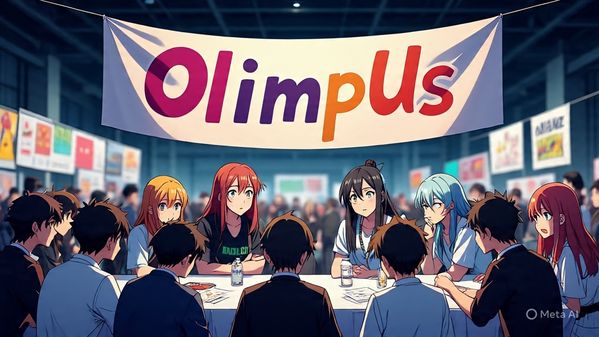The Rise, Reality, and Resilience of OlimpUs Scanlation: Inside the Underground World of Fan-Driven Manga Culture
Introduction
On the surface, OlimpUs Scanlation might seem like just another name in the world of online manga translations. But for those who’ve spent countless nights waiting on fan-forged chapters of obscure seinen or long-forgotten shoujo, this group has carved out a surprisingly influential niche. Not every reader knows their name, but anyone who’s scrolled through fan-translated manga in the last decade has likely read their work.
So what is OlimpUs Scanlation, really? More importantly, why does it matter?
This article dives deep into the complex ecosystem of scanlation—where amateur translators, editors, and cultural enthusiasts keep global manga fandom alive. But this isn’t just about piracy or fan projects. It’s a nuanced story of passion, gray legal zones, and the evolving role of grassroots translation in a billion-dollar industry.
Let’s take a closer look at OlimpUs Scanlation—not just as a group, but as a case study in how fan-driven labor challenges corporate limitations, reshapes access, and preserves art that might otherwise disappear into publishing limbo.
What Is OlimpUs Scanlation and Where Did It Come From?
OlimpUs Scanlation isn’t a publishing house, a legal company, or even an officially recognized group. It’s a decentralized, volunteer-based collective of manga fans who have taken it upon themselves to translate, clean, typeset, and distribute Japanese manga to a global audience—long before official releases ever see the light of day.
A Brief Timeline of Their Emergence
-
Early 2010s: OlimpUs began surfacing on manga aggregator sites, quietly building a reputation for their clean scans and thoughtful, non-literal translations. While the exact origins remain opaque (as most scanlation groups operate anonymously for legal reasons), early users on Reddit and MyAnimeList recall seeing their tags on rare, untranslated series.
-
2015–2018: OlimpUs hit its stride by focusing on under-the-radar series—especially seinen manga and less-commercial shoujo works. These weren’t mainstream hits. They were cult classics and unfinished gems.
-
Post-2020: As mainstream publishers like VIZ, Kodansha, and Yen Press ramped up digital releases, OlimpUs didn’t retreat—they doubled down on niche content, picking up titles that were region-locked, incomplete, or outright ignored by licensing houses.
A Name That Means Something
Unlike flashy scanlation names like “MangaRaiders” or “BlackBirdSubs,” the name OlimpUs evoked something loftier—perhaps a metaphorical nod to Mount Olympus. To the group, manga wasn’t just entertainment. It was divine culture that deserved to be shared beyond borders.
Why OlimpUs Scanlation Matters More Than Most Realize
While some might dismiss scanlation as mere piracy, this perspective flattens the cultural importance of what groups like OlimpUs provide. They don’t just translate words—they act as cultural custodians.
1. They Preserve Lost or Abandoned Series
Many manga titles are dropped by publishers mid-run due to poor sales or licensing issues. OlimpUs often steps in where publishers fall short. This isn’t about stealing—it’s about finishing what was started.
Case in point: The manga “Kurosawa: The Legend Lives On”, left unfinished in English-speaking regions, was completed unofficially by OlimpUs—earning praise in forums like MangaHelpers and Reddit’s r/manga.
2. They Respect the Source Material
While some scanlation groups prioritize speed over accuracy, OlimpUs is known for its nuanced, almost literary translations. They preserve Japanese honorifics, cultural references, and subtle tonal differences—adding translator notes when needed instead of Americanizing content.
“We’d rather delay a chapter than dumb it down,” an anonymous OlimpUs editor posted in a now-deleted Pastebin Q&A from 2022.
3. They Build Global Fandoms
Without scanlations, many manga series would never find their way to a non-Japanese audience. Groups like OlimpUs act as bridges—facilitating fanbases that later pressure publishers to license these series officially.
The Legality & Ethics: Walking the Fine Line
Let’s not sugarcoat it—scanlation exists in a legal gray area. Technically, it violates copyright laws. However, enforcement is inconsistent, and the ethical debate remains unresolved even within fandoms.
The Unspoken Truce
-
Publishers Turn a Blind Eye – As long as scanlations don’t hurt licensed content or monetize their work, publishers often ignore them. OlimpUs doesn’t sell ad space, doesn’t monetize links, and typically drops projects once they’re officially licensed.
-
Readers Often Don’t Know – Many casual manga readers encounter scanlations without understanding the legality. Aggregator sites host them without context. Groups like OlimpUs usually include disclaimers asking readers to support official releases when available.
The Morality of Filling a Gap
Imagine a brilliant novel exists, but it’s only available in Japanese. Would it be wrong for a bilingual fan to translate it for others—for free? That’s the moral foundation many scanlators operate on. It’s about access, not profit.
Behind the Scenes of a Typical OlimpUs Scanlation Workflow
Despite being volunteers, OlimpUs runs like a professional editorial team. Let’s break down the process:
| Stage | Role Involved | Details |
|---|---|---|
| 1. Raw Acquisition | Raw Providers | Members obtain high-quality manga scans from Japanese sources. |
| 2. Translation | Translators | Fluently bilingual members translate text from Japanese to English. |
| 3. Cleaning | Photoshop Editors | Remove original text, adjust contrast, fix scan defects. |
| 4. Typesetting | Typesetters | Add English text with manga-appropriate fonts, preserving flow and tone. |
| 5. Proofreading | Senior Editors | Review grammar, cultural notes, and fidelity to the source material. |
| 6. Release | Distributors & Uploaders | Chapters are posted anonymously on platforms like MangaDex, not monetized. |
The Commitment Is Real
For one 20-page chapter, it can take 8–12 hours of collaborative work. All for free. All for fandom.
Scanlation in the Era of AI, Automation, and Corporate Takeover
You might think AI translators would replace fan groups like OlimpUs. But that’s not happening—at least not meaningfully.
Why Machine Translation Falls Short
-
Contextual Nuance: Japanese is highly contextual. A phrase like “仕方がない” can mean everything from “It can’t be helped” to “This is fate,” depending on tone. AI can’t always catch that.
-
Cultural Meaning: Idioms, honorifics, slang—machines miss cultural essence that scanlators take the time to explain.
-
Fan Culture: Readers often crave the fan-layer—translator notes, easter eggs, commentary. AI doesn’t offer community. OlimpUs does.
The Future of OlimpUs Scanlation: Resistance or Evolution?
With manga publishers going global and digital-first, where does that leave a group like OlimpUs?
Possible Paths Forward
-
Specialization: They may focus more on rare, older series unlikely to be licensed.
-
Partnerships?: Some industry insiders speculate that publishers might one day hire veteran scanlators as freelancers. So far, it remains rare but not impossible.
-
Archival Role: There’s rising demand for unofficial preservation efforts. OlimpUs could evolve into manga archivists—documenting fan culture for posterity.
Conclusion
OlimpUs Scanlation isn’t just a group of manga fans doing unpaid labor—they’re cultural mediators operating in the blurry borderlands of legality and art. They fill gaps that commercial systems overlook, and in doing so, they preserve voices, art, and stories that might never have been heard.
In an ideal world, there would be no need for scanlation. But in the real world, groups like OlimpUs ensure that art survives bureaucracy, capitalism, and language barriers. That’s not piracy—it’s preservation.
If you’ve ever discovered a life-changing manga that had no official translation, chances are you’ve got a group like OlimpUs to thank.
FAQs About OlimpUs Scanlation
Q1: Is OlimpUs Scanlation still active in 2025?
Yes. While less prolific than before, they still occasionally drop rare, unfinished, or previously untranslated chapters—particularly for older series. They’re more selective, but not gone.
Q2: Are their translations better than official ones?
In some cases, yes. OlimpUs often prioritizes cultural accuracy over localization, which many purists prefer. Official translations may sanitize or simplify the text for broader audiences.
Q3: Can I join OlimpUs Scanlation?
They don’t publicly recruit like some other groups. However, veteran community members on platforms like MangaDex or Discord sometimes get tapped based on portfolio or reputation.
Q4: Why do scanlators stop once a manga is licensed?
Out of respect for creators and copyright holders. Groups like OlimpUs typically post a note encouraging fans to support the official release once it’s available.
Q5: Is reading scanlations illegal?
Legally gray. Hosting and distributing them is copyright infringement, but individual readers are rarely targeted. Ethically, many argue it’s justified if no official version exists.
Q6: What sets OlimpUs apart from other scanlation groups?
Their care. Their style. Their dedication to translating art without distortion. They’re not just fans—they’re curators of culture.



